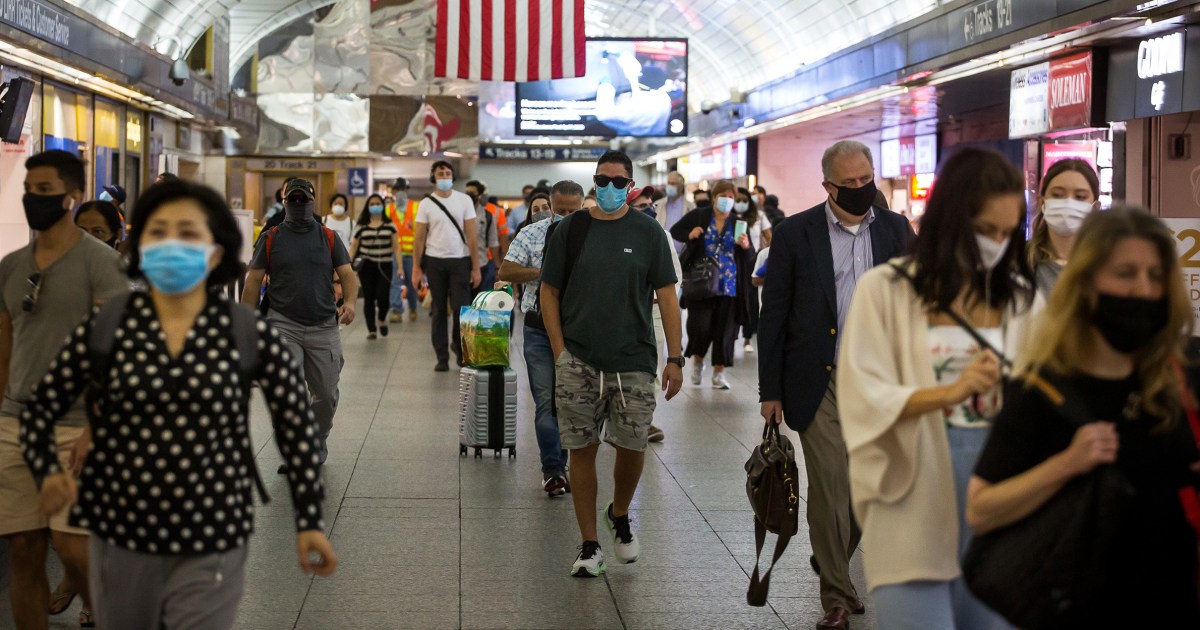Entering the holiday season last year, surging Covid-19 cases overwhelmed hospitals. This year, hospitals are being overwhelmed with a combination of Covid, respiratory syncytial virus (RSV) and the flu. Along with RSV, the record number of flu cases pushing pediatric hospitals near to capacity is a worrisome signal that the current flu season will be the worst in years. Facing a particularly acute crisis, pediatric hospitals have called upon President Joe Biden to declare an emergency to provide more resources to respond to the current surges.
This “tripledemic” of flu, Covid and RSV is a reminder that even as the pandemic ends, the threat of seasonal respiratory viruses remains. Thankfully, our toolkit for tackling them is similar to what works to suppress Covid alone, starting with the most basic and flexible level of protection: masking. When and where respiratory viruses are surging, mask mandates should be reinstated.
It’s difficult for people to get adequate, high-quality information about risk and apply it in a society that has returned to pre-pandemic norms.
Masks work and, critically, they don’t need to work perfectly to have a positive impact. A recent study found that Boston school districts that had lifted mandates averaged 45 more Covid cases per 1,000 students and staff than those with mandates. Other evidence has suggested that masks are effective against influenza as well, with some scientists suggesting that widespread masking during the first two years of the pandemic contributed to the historically low rates of flu and RSV observed in those years.
RSV, a respiratory illness that causes coldlike symptoms and can be especially severe for young children and the elderly, spreads through the air like Covid but also through contact on surfaces. This means that RSV — for which a vaccine is still being developed — can be mitigated through both mask-wearing and hand-washing.
In a typical year, RSV causes up to 80,000 hospitalizations and 300 deaths among children under 5, and up to 10,000 deaths and 120,000 hospitalizations among adults aged 65 and older. As with flu and now Covid, individual adverse outcomes are rare relative to the number of cases, but more spread and more infections means more people experience serious outcomes. Even with the pandemic receding, an average of 300 people are still dying from Covid every day. Unvaccinated people face six times the risk of death based on recent data, but many people dying now are vaccinated as well.
Unfortunately, as mask mandates and public health messaging have disappeared and complacency or resignation takes hold, the public’s voluntary compliance with healthy behaviors such as wearing masks and getting booster shots is waning, while businesses continue to roll back sick leave and remote work policies.
Hospitals remain overwhelmed as they face the chronic strain of the past few years and staffing issues. Though pediatric hospitals are the most affected, the whole system is struggling and emergency room wait times have increased. Masking may not prevent all infections, but preventing any infections helps alleviate the burden.
Mask mandates not only stem the spread of diseases but also have helpful psychological benefits. It’s difficult for people to get adequate, high-quality information about risk and apply it in a society that has returned to pre-pandemic norms. Promoting mask-wearing through official messaging (ideally supported by free provision of high-quality masks like N-95s) removes the onus on individuals to figure out “what is safe.”
Even if governments do not apply broad mandates, institutions and events can apply their own. The Supreme Court recently ruled that the Transportation Security Administration did indeed have the authority to mandate masks. Studies show that when two people mask it is more effective than when one person alone masks, and a mandate preempts the awkwardness of having to ask people to mask or of having to disclose a high-risk condition.
Coming out of our Covid experience, disease mitigation should be an ongoing practice that can be dialed up when necessary rather than a switch that turns on or off completely. We should always encourage mask-wearing during fall and winter seasons (as these respiratory viruses tend to transmit more efficiently in colder weather due to changes in humidity and how much time people spend indoors) and in busy places like mass transit and grocery stores.
Behaviors like hand-washing (especially relevant for RSV) and staying home while sick should also be promoted, alongside policies that allow people to do so. Seventeen states and countless cities have already mandated paid sick leave in some form; the federal government should follow suit. These policies have the potential to facilitate a cultural and behavioral shift in how we approach illness and public health, even in “quiet” years.
Understanding that viruses will continue to be a threat cuts against the “Covid is over” mentality and adds further pressure on Congress to fund mitigation measures in a sustainable way. Currently, the Covid response is under threat because Congress has not reached an agreement on a spending package. As a result, Covid vaccinations may not be free next year, and development of the new generation of intranasal Covid vaccines in the U.S. could suffer without more funding.
This partisan gridlock and congressional inaction also translate into anemic efforts to mandate clean air standards, even though proper ventilation can limit the spread of airborne pathogens. The White House is promoting such efforts, but without strong building regulations and funding for renovations, such upgrades remain at the discretion of individual building owners.
We are all tired — of the pandemic and its attendant disruptions to our lives, of taking mitigation measures, and of being sick. But we cannot remain complacent as our health systems are once again challenged. And even when this challenge passes, we will need to deal with future surges. The pandemic has taught us that levels of community transmission of respiratory diseases can increase quickly and unpredictably. Luckily, it has also taught us how to take action to decrease their dangers.f
Share your story or advertise with us: Whatsapp: +2347068606071 Email: info@newspotng.com















